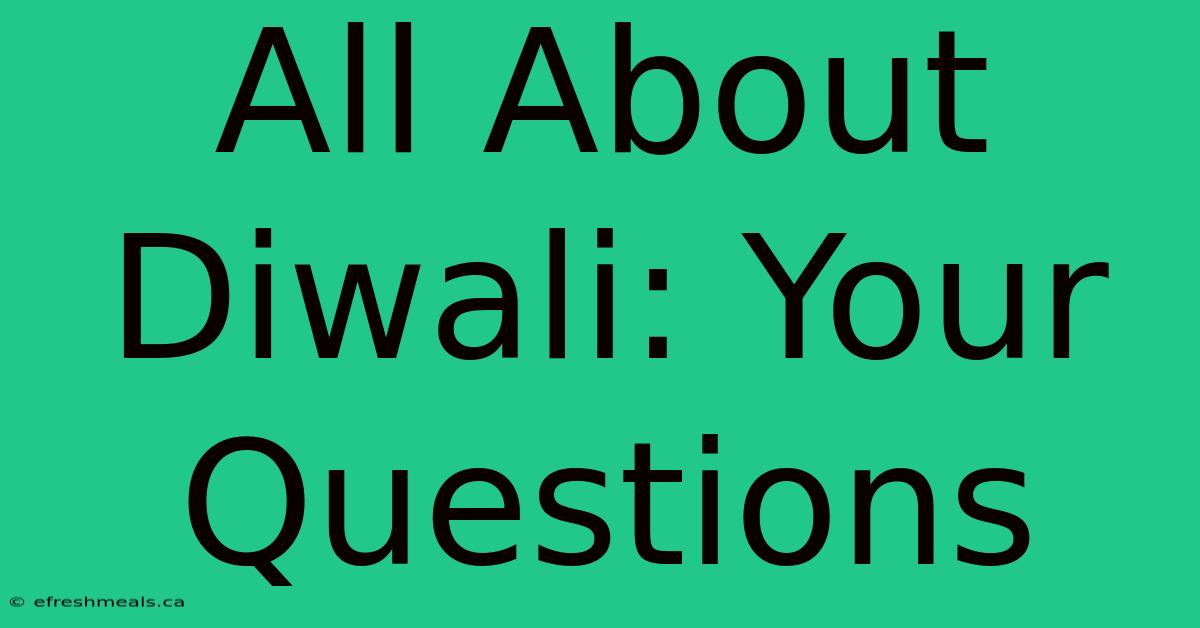All About Diwali: Your Questions

Discover more detailed and exciting information on our website. Click the link below to start your adventure: Visit Best Website nimila.me. Don't miss out!
Table of Contents
All About Diwali: Your Questions Answered
Have you ever wondered what Diwali is all about? This vibrant festival of lights holds a special place in the hearts of millions around the world. It's a time for joy, celebration, and reflecting on the triumph of good over evil. But with so many traditions and customs associated with Diwali, it can be overwhelming to understand it all.
Why It Matters: Diwali is a significant cultural event that transcends borders and brings people together. Understanding the meaning behind this festival allows us to appreciate its rich history, cultural significance, and the values it embodies.
Key Takeaways of Diwali:
| Key Takeaway | Description |
|---|---|
| Festival of Lights: Diwali symbolizes the victory of light over darkness, knowledge over ignorance, and good over evil. | |
| Celebration of New Beginnings: It marks the beginning of a new year in the Hindu lunisolar calendar and is associated with prosperity and good fortune. | |
| Story of Lord Rama's Return: Diwali commemorates the return of Lord Rama to Ayodhya after 14 years of exile, signifying the triumph of dharma and the defeat of evil. | |
| Religious and Cultural Significance: Diwali is celebrated by Hindus, Sikhs, and Jains, each with their own interpretations and traditions. | |
| Global Celebration: Diwali is celebrated with great fervor across India and by diaspora communities around the world. |
Let's delve deeper into the fascinating world of Diwali and answer some frequently asked questions:
All About Diwali: Your Questions Answered
What is Diwali?
Diwali is a major Hindu festival celebrated annually in autumn, which typically falls in October or November. It is a five-day festival, with the main day of celebration coinciding with the new moon night of the Hindu lunisolar month of Kartik. Diwali is observed across India and by Hindu communities worldwide.
What does Diwali symbolize?
Diwali symbolizes the victory of good over evil, knowledge over ignorance, and light over darkness. It celebrates the return of Lord Rama to Ayodhya after 14 years of exile, signifying the triumph of dharma and the defeat of evil. Diwali is also seen as a time for new beginnings, prosperity, and good fortune.
Why are lights so important in Diwali?
The lights represent the triumph of light over darkness. The festival is associated with illuminating homes, streets, and temples with diyas (earthen lamps), candles, and electric lights. The lights symbolize hope, knowledge, and the dispelling of negativity.
What are the main rituals and customs associated with Diwali?
The main rituals during Diwali include:
- Lighting diyas and candles: This is a central part of Diwali celebrations. Homes, temples, and streets are illuminated with diyas and candles.
- Fireworks: Fireworks are a popular tradition, especially on the main day of Diwali.
- Laxmi puja: This is a prayer offering to the goddess Laxmi, the goddess of wealth and prosperity. It is believed that offering prayers and worshiping Laxmi brings good fortune.
- Rangoli: This is the art of creating intricate designs on the floor using colored powders, flowers, and other materials. Rangoli signifies beauty, welcome, and good luck.
- Sharing sweets and gifts: This is a part of Diwali celebrations where people exchange sweets and gifts with family, friends, and neighbours.
How is Diwali celebrated around the world?
Diwali is celebrated with great fervor across India, with each region having its own unique traditions and customs. For instance, in West Bengal, Diwali is known as Kali Puja and is celebrated with special rituals dedicated to goddess Kali.
In other parts of the world, Indian diaspora communities also celebrate Diwali with elaborate processions, cultural events, and communal gatherings.
What are some fun activities that can be done during Diwali?
- Attend a Diwali mela: This is a street fair or carnival that features cultural performances, food stalls, and traditional crafts.
- Decorate your home: This can be done with diyas, candles, and other decorative elements like rangoli.
- Make Diwali sweets: This is a fun family activity that involves preparing traditional sweets like laddu, barfi, and gulab jamun.
- Share gifts: This is a great way to spread joy and good wishes during Diwali.
- Dress up in traditional attire: This is a fun way to celebrate the cultural significance of Diwali.
What are some key takeaways for understanding Diwali?
Diwali is a powerful reminder of the importance of light over darkness, good over evil, and the triumph of dharma. It emphasizes the significance of knowledge, prosperity, and new beginnings. The festival promotes unity, joy, and togetherness, bringing people from all walks of life together in celebration.
Conclusion:
Diwali is a vibrant and meaningful festival that celebrates the triumph of good over evil and the coming of new beginnings. It's a time for joy, celebration, and reflecting on the values that make life worth living. By understanding the deeper meaning behind the festivities, we can better appreciate the rich cultural heritage and the spirit of Diwali.
Let the lights of Diwali illuminate your life with joy, prosperity, and peace!

Thank you for visiting our website wich cover about All About Diwali: Your Questions. We hope the information provided has been useful to you. Feel free to contact us if you have any questions or need further assistance. See you next time and dont miss to bookmark.
Featured Posts
-
Ohtanis Contract Talks With Dodgers Inside Look
Nov 01, 2024
-
Halloween Costume Ideas For Pets
Nov 01, 2024
-
Halloween 2024 Lgbtq Celebs Winning Looks
Nov 01, 2024
-
In This Edition October 31 2024
Nov 01, 2024
-
Celtics Pacers Loss Consistency And Defense Issues
Nov 01, 2024
